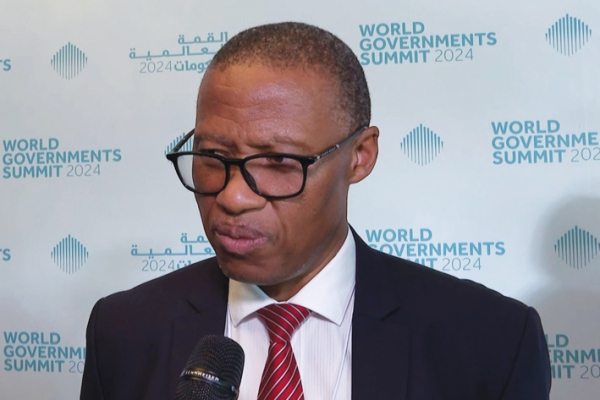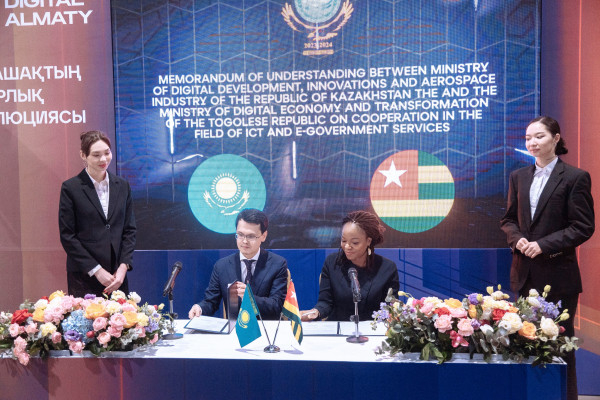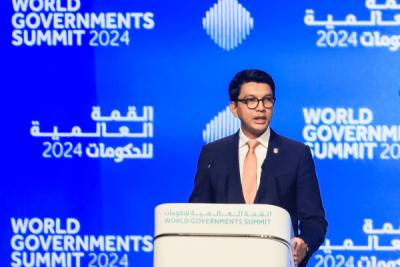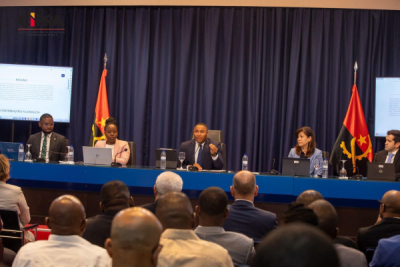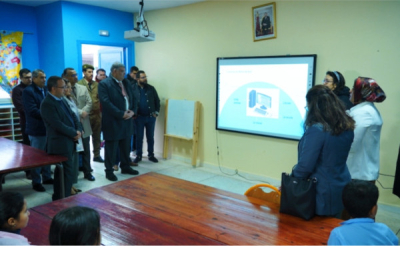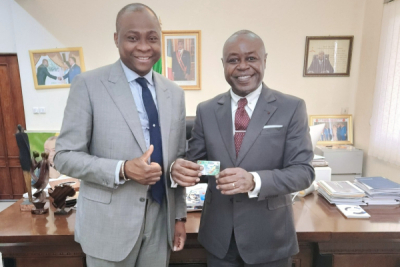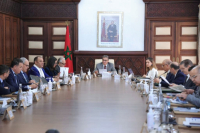
Tech (807)
Like many sub-Saharan nations, Lesotho grapples with digital education challenges. However, the government aims to leverage assistance from more advanced countries to significantly improve the situation in the coming years.
Lesotho's Education Minister Ntoi Rapapa signed a memorandum of understanding (MoU) with the United Arab Emirates (UAE) to boost digital education, aiming to establish "digital schools" in the African nation.
This collaboration concluded at the World Government Summit in Dubai, reflects the commitment of both countries to equip communities for the digital age. Under the agreement, the UAE's "Digital School" program, launched in 2020 by Prime Minister Sheikh Mohammed bin Rashid Al Maktoum, will be extended to Lesotho.
This program promotes continuous innovation in education through game-based modules and AI-driven adaptive learning. The initiative is crucial for Lesotho, where only 5% of primary schools currently possess digital education equipment, according to government data.
Rapapa also highlighted efforts to digitize other sectors in Lesotho, including government administration. Currently, only three of the 18 ministries utilize e-governance practices. The plan aims to digitize all ministries within the next 2-5 years.
Samira Njoya
Togo's push towards digitalization has gained momentum following the creation of Agence Togo Digital, a government agency overseeing digital projects. To accelerate progress, the country is actively seeking partnerships.
Togo and Kazakhstan have expanded their bilateral collaboration in information and communication technologies (ICT) through a memorandum of understanding (MoU) signed at the Digital Almaty Forum.
Signed by Togo's Digital Economy Minister Cina Lawson and Kazakhstan's Digital Development Minister Bagdat Mussin, the MoU focuses on supporting the "Togo Digital 2025" strategy, particularly digitizing administration and citizen services.
This cooperation aligns with a broader rapprochement between the two countries, following President Faure Gnassingbé's visit to Astana in November 2023 and the upcoming prospecting mission by a Kazakh delegation to Togo this week.
Under the MoU, Kazakhstan will assist Togo in implementing its digital agenda, drawing on its own e-governance experience. Kazakhstan launched its eGov.kz portal in 2006, offering over 200 automated services, and ranks 28th globally in the UN's e-Government Development Index (EGDI).
Similarly, Togo launched its national public services portal in 2022, including services like passport applications and building permits. This partnership aims to accelerate digitization in Togo, leveraging Kazakhstan's expertise.
Samira Njoya
Sub-Saharan Africa is poised to see the fastest growth in demand for digital skills globally, according to the International Finance Corporation (IFC). This poses a significant challenge in preparing young people for these emerging opportunities.
Madagascar and the United Arab Emirates partnered on Tuesday to train over a million young Malagasy people in new technologies through the "Digital School" and "Coders Initiative" projects. The initiative, announced at the World Government Summit in Dubai, aims to equip youth with in-demand digital skills to improve their employability and contribute to Madagascar's economic development.
“The future lies in preparing our future generations to face challenges with innovative technological weapons that will forge their world of tomorrow. The hopes of an entire generation lie in our hands, the leaders of today. We must assist them towards a better future,” President Andry Rajoelina (photo) stated.
Digital School, already established in eight countries, will provide flexible learning opportunities through digital training centers in Madagascar. These centers will utilize advanced technologies like artificial intelligence to complement the national curriculum and develop students' skills in areas like coding and data analysis. The "Coders Initiative" will likely focus on more intensive training programs for specific IT professions.
With over 1.5 million instructors trained and 60,000 students enrolled globally, Digital School has a proven track record of success. Its expansion into Madagascar, coupled with the "Coders Initiative", has the potential to significantly improve the digital literacy and employability of young Malagasy people.
Samira Njoya
The Angolan government is launching a series of digital projects to streamline access to public services and meet citizens' demands for electronic solutions. However, the success of these initiatives may hinge on improving the country's internet infrastructure.
The implementation of Angola's ambitious Digital Acceleration Program (PADA) is encountering challenges, with limited internet access across the country emerging as a major hurdle.
During a public consultation session on PADA, Meick Afonso (photo), Director General of the Institute of Administrative Modernization (IMA), highlighted the issue to stakeholders, stating that for the transformation to be successful, it is essential that every citizen is connected.
PADA, a $300 million initiative funded by the World Bank, aims to drive digital inclusion, expand access to public services, and stimulate the digital economy. Ultimately, it seeks to transform Angola into a fully digitized society, streamlining access to administrative documents.
However, achieving this vision hinges on a reliable internet infrastructure. While recent developments such as Angola's connection to Meta's 2Africa fiber optic cable and a $249 million loan for a national broadband project bode well, current penetration remains low.
Statistics from the Angolan Institute of Communications (INACOM) indicate 10.08 million internet users in the country. However, a December 2023 report by the International Telecommunications Union (ITU) ranks Angola 24th in Africa for ICT development, with a score of only 44.1 out of 100.
Samira Njoya
The COVID-19 pandemic has accelerated the adoption of digital education in schools, highlighting the need for integrating modern technologies and teaching methods to prepare students for an increasingly digital world. This shift aims to equip future generations with the skills and knowledge to navigate the evolving challenges and opportunities of our digital society.
Swiss building materials giant LafargeHolcim unveiled its "Connected Classrooms" initiative on Friday, February 9, aiming to address the challenge of school dropout in Morocco.
The three-year program, launched in early 2023, targets schools near LafargeHolcim's sites across the country, initially providing 26 schools and 13,000 students with high-quality IT equipment. This includes desktop and laptop computers, interactive whiteboards, printers, projectors, and Wi-Fi connections.
"We are [...] invested in various projects to support education and children in communities near our sites, with a particular focus on preventing school dropout," said Zineb Bennouna, Communications and CSR Director at LafargeHolcim Morocco, in a press release.
The initiative promotes community-based education and provides access to online educational resources. This aligns with the government's efforts to digitize educational services and improve the quality of the system.
LafargeHolcim describes the program as part of its broader "N'Bniouw l'7ayat" social responsibility program, which aims to create an inclusive learning environment and reduce school dropout within local communities.
Samira Njoya
Following global trends, Congo has initiated the digitization of driving licenses, aiming to address longstanding issues plaguing its road sector. This effort seeks to improve efficiency, transparency, and security within the system, ultimately contributing to safer roads and better transport management.
Congo is launching new, highly secure biometric driving licenses as part of a broader digital transformation push, officials announced Thursday.
Presented by Land Transport Director General Mopaya Atali (photo, left) on February 8th, the license aims to standardize identification and combat security issues plaguing the sector.
Initially planned for 2023, the initiative also tackles inadequate driver training and aims to decrease road accidents. It aligns with the government's Digital Transformation Acceleration Program (PATN) and follows the June deployment of a biometric vehicle license plate system.
These reforms address long-standing challenges in the road transport sector, including insecure data management and a lack of reliable electronic archiving. The new licenses aim to enhance security, simplify administrative processes, improve road safety, and integrate with other digital services.
Samira Njoya
Since his appointment as Vice-President, Mahamudu Bawumia has helped position Ghana on the international technological and digital scene. He aspires to even greater achievements in this field, should he become President of the Republic.
Ghanaian Vice President Mahamudu Bawumia (photo), nominated as presidential candidate for the New Patriotic Party (NPP), unveiled an ambitious digital program on Wednesday. Bawumia, seeking to leverage his tech-focused image, outlined a vision for a "digital Ghana" that applies technology across key economic sectors.
The program's core includes training one million digital talents over five years, with a focus on software skills. This aims to meet the growing domestic and global demand for tech professionals. Additionally, education reforms prioritize STEM fields, robotics, AI, and vocational training to prepare for the Fourth Industrial Revolution.
Bawumia also pledged to abolish the 1.5% electronic transaction tax, dubbed the "E-levy," to promote a cashless economy and encourage digital payments. Infrastructure development is another key component, aiming to reduce internet costs and bridge the digital divide. The program targets a 100% internet penetration rate, compared to the current 72%.
The presidential candidate’s vision encompasses digitizing all sectors, from agriculture and healthcare to education, manufacturing, and finance. This aims to create jobs for young people and position Ghana as a regional digital hub.
Samira Njoya
Morocco is aiming to solidify its position as a leading player in the global economy by harnessing the digital revolution. However, achieving this vision requires a well-defined strategic roadmap to address digital challenges and seize emerging opportunities.
The Moroccan government is in the final stages of formulating its digital transformation strategy, “Maroc digital 2030”, as revealed by Ghita Mezzour, Minister Delegate in charge of Digital Transition and Administrative Reform, at the inaugural meeting of the National Committee for Digital Development on Wednesday.
According to Mezzour, the strategy is anchored in two key pillars: the digitization of public services and the cultivation of a vibrant digital economy centered on local innovation and job creation. The plan encompasses bolstering the offshoring sector, fostering a conducive ecosystem for startups and SMEs, and supporting the digital transformation of small and medium-sized businesses.
As part of the strategy, the government aims to generate 300,000 jobs in the digital sector by 2030, potentially contributing up to 170 billion dirhams ($16.9 billion) to the national GDP. Plans are also in place to extend Internet and telephone coverage, particularly in rural areas, with a focus on the deployment of fiber optics and the medium-term adoption of 5G technology.
The meeting also highlighted the importance of artificial intelligence as part of Maroc Digital 2030, emphasizing its potential to improve public services and position the country as a leader in AI development.
Samira Njoya
African nations are witnessing a renewed interest in the space industry, with several countries ramping up investments and initiatives. Among these, Egypt stands out as a regional leader, actively pursuing ambitious space programs.
The Egyptian Space Agency (EgSA) successfully launched its experimental NExSat-1 satellite on Saturday, February 3, using China's Jielong-3 launch vehicle. This move aims to position EgSA as a pioneer in microsatellite technology within Egypt and Africa, contributing to the nation's sustainable development and potentially opening economic opportunities through domestic satellite production.
EgSA confirmed successful signal reception from NExSat-1 through a test on its website. The satellite, designed for remote sensing and scientific research, was assembled and tested at EgSA's Satellite Assembly, Integration and Test Center (AITC) in collaboration with the Egyptian National Authority for Remote Sensing and Space Science (NARSS) and Berlin Space Technologies (BST).
This launch follows the December 2023 deployment of MisrSat-2, an Earth observation satellite, further solidifying EgSA's leading role in African space science and technology. The agency seeks to build on this momentum in 2024.
"We are planning to launch two more satellites, AfdevSat (African development satellite) and SPNEX (Space Plasma Nanosatellite Experiment), primarily for climate change monitoring," said EgSA Director General Sherif Sedky in December 2023. "Additionally, we aim to expand collaboration with other African countries, particularly for commercializing MisrSat-2 images and applications."
According to the 2022 edition of Space In Africa's annual report, African nations allocated $523.2 million to space programs in 2021 and $534.9 million in 2022, highlighting a growing interest in the sector.
Morocco, in its pursuit of a digital transition program, recognizes the critical need for a digitally skilled workforce. The country has strategically partnered with experienced partners to address this challenge.
Morocco’s Ministry of Digital Transition and Administrative Reform on Tuesday announced a program contract with Maroc Numeric Cluster (MNC), a public-private entity, to enhance digital innovation. The contract was signed by Ghita Mezzour, Minister Delegate for Digital Transition and Administrative Reform, and Mehdi Kettani, President of MNC.
The program aims to bolster digital innovation by nurturing talent and aiding startups and SMEs. “This contract reflects the desire of both parties to strengthen the digital innovation ecosystem through several lines of action, including training and integration of talent, content production, dissemination of the culture of innovation, collaboration, and digital entrepreneurship, and support for the emergence of digital innovation projects in various economic sectors,” the Ministry stated.
Under this contract, MNC will undertake a pivotal role in training youth in ICT skills to ease their professional integration. The pilot phase targets 1,000 beneficiaries, with 734 already graduated and an anticipated integration rate of 72%.
The partnership will also promote startups via events, training, and collaboration with incubators, accelerators, professional associations, and partnerships. Regular monitoring, analysis, and studies will be conducted to identify trends and invigorate the sector.
These initiatives are part of Morocco’s new digital strategy, “Maroc Digital 2030”, succeeding the previous strategy that aimed to position Morocco as a leading digital and technology hub in Africa by 2025. The new strategy underscores the importance of talented, creative youth.
Samira Njoya
More...
As 2023 concluded, numerous specialized companies and platforms are evaluating the capital invested in diverse ecosystems. This data holds crucial significance for the growth of the digital economy, particularly in the African tech ecosystem.
African fintech startups raised $852 million in 2023, a 56% decline from the record $1.9 billion secured in 2022, according to the 2023 edition of Partech Africa's Africa Tech Venture Capital report, published in January 2024. The number of deals also dropped by 48%, falling from 217 in 2022 to 113 last year.
Despite the decrease, fintech remains the most attractive sector for investors in Africa, accounting for 37% of all equity financing on the continent in 2023 and 24% of all deals. This is attributed to the sector's strong track record and continued relevance in addressing under-banking and promoting financial inclusion. Of the eight unicorns on the continent, seven operate in the sector, with only Jumia being in the e-commerce sector.
"Fintech plays a critical role in addressing infrastructural challenges in Africa. Beyond just being payment applications, these solutions are essential in enabling a wide range of ventures," the report said. "By establishing both local and cross-border solutions, and fostering key connections between individuals, businesses, and financial institutions, Fintech’s role remains integral to the ecosystem."
Despite the overall funding slowdown, the healthtech and agritech sectors saw growth in 2023. Healthtech funding rose 17% to $212 million, while agritech investments jumped 67% to $144 million compared to 2022.
Adoni Conrad Quenum
After numerous declarations, global tech giants are gradually deploying their investments in Africa. This time Google is investing in the development of top-tier infrastructure.
U.S. technology giant Google on Wednesday announced the opening of its first data center in Africa, located in Johannesburg, South Africa.
The facility, part of Google's $1 billion investment to boost Africa's digital transformation, is designed to support businesses on the continent with cloud computing resources needed to "evolve, innovate and compete in the global marketplace," according to a company press release.
"This marks our 40th cloud region globally, connecting Johannesburg to our secure global network," the release said, adding the center would offer Google Cloud services to businesses across Africa.
Google estimates Africa's internet economy could reach $180 billion by 2025, representing 5.2% of the continent's GDP. However, Google faces competition in the growing African cloud market. Rivals like Oracle, Amazon Web Services, and Microsoft already have a presence, while local players like Africa Data Centres are also vying for market share.
Adoni Conrad Quenum
Nigeria, like many other countries, faces persistent challenges when it comes to electronic fraud, particularly bank card fraud. To counter this threat to the economy, initiatives are currently being rolled out across the country.
The Central Bank of Nigeria (CBN), in partnership with the Nigerian Electronic Fraud Forum (NeFF) and the Association of Mobile Money and Banking Agents of Nigeria (AMMBAN), is set to introduce a new feature aimed at improving the detection of potentially fraudulent transactions. This initiative, a response to the country’s increasing fraud incidents, will necessitate specific Know Your Customer (KYC) details for validating certain transactions.
Fasasi Sarafadeen Atanda, AMMBAN’s Chairman, stated that the technological development of this feature is nearing completion, with its activation slated for the first quarter of this year. Point-of-service terminals nationwide will prominently display this new feature, enabling the identification, reporting, and cancellation of suspicious transactions.
This measure is a reaction to a significant surge in fraud, as evidenced by data from the Financial Institutions Training Center (FITC). In the second quarter of 2023, Nigerian deposit banks reported fraud-related losses of 9.75 billion naira ($10.8 million), marking a 276% increase from the same period in 2022, when losses totaled 5.79 billion naira.
The ultimate objective of this innovation is to foster a more secure, transparent, and regulated financial ecosystem in Nigeria. By bolstering consumer trust in electronic financial services, it aims to stimulate healthy and robust sector growth.
Samira Njoya
Liberia's incoming president, Joseph Boakai, will prioritize youth when building on outgoing leader George Weah's digital technology initiatives to power economic growth, officials said. Weah, a former soccer star, launched projects during his term to leverage technology and promote entrepreneurship. The incoming president intends to take these efforts further, with a focus on empowering young Liberians through tech-driven opportunities.
Liberia’s newly inaugurated President, Joseph Boakai (photo), pledged to enhance the digital skills of over 10,000 young Liberians during his first address to the nation on Monday, January 29, at the Capitol Building. “In our quest to expand the economy, we will leverage Information Communication Technology (ICT) in creating jobs, especially for our youth. To achieve this, my Administration will train up to 10,000 young people in various digital skills in the first half of 2024. The Liberian middle-class goal must be a reality in the next 6 years,” Boakai declared.
This ambitious initiative aims to prepare young people for the digital age by bridging the country’s existing technology gap and ensuring that Liberians are competitive in the global marketplace. This project continues the digital initiatives of former President George Weah, which included the establishment of a national digital transformation project in partnership with the Liberia Telecommunications Authority (LTA), the construction of a national fiber optic network with Kenyan company CSquared, and the digitization of public services and modernization of the Post Office.
It’s worth noting that Liberia significantly lags in the digital field in Africa. According to the latest statistics from DataReportal, as of the start of 2023, the country had 1.80 million Internet users, a penetration rate of 33.6% for a population of 5.36 million. Additionally, the number of social media users was 642,100 in January, representing 12.0% of the total population. In terms of mobile connectivity, Liberia recorded a total of 4.20 million active cellular mobile connections at the start of 2023, equivalent to 78.4% of the total population.
Samira Njoya


